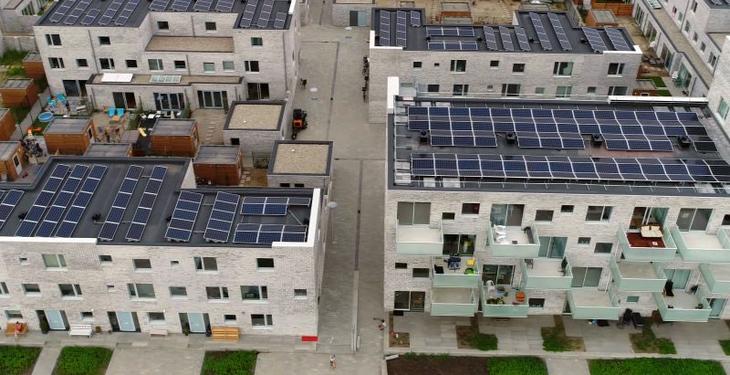The European Commission has published today its Renovation Wave Strategy to improve the energy performance of buildings. The Commission aims to at least double renovation rates in the next ten years and make sure renovations lead to higher energy and resource efficiency. By 2030, 35 million buildings could be renovated and up to 160,000 additional green jobs created in the construction sector.
Buildings are responsible for about 40% of the EU’s energy consumption, and 36% of greenhouse gas emissions. But only 1% of buildings undergo energy efficient renovation every year, so effective action is crucial to making Europe climate-neutral by 2050. With nearly 34 million Europeans unable to afford keeping their homes heated, public policies to promote energy efficient renovation are also a response to energy poverty, support the health and wellbeing of people and help reduce their energy bills. The Commission has also published today a Recommendation for Member States on tackling energy poverty.
ALSO READ Cogeneration, in or near buildings, is uniquely placed to enable an ambitious Renovation Wave
The strategy will priorities action in three areas: decarbonization of heating and cooling; tackling energy poverty and worst-performing buildings; and renovation of public buildings such as schools, hospitals and administrative buildings. The Commission proposes to break down existing barriers throughout the renovation chain – from the conception of a project to its funding and completion – with a set of policy measures, funding tools and technical assistance instruments.
The strategy will include the following lead actions
- Stronger regulations, standards and information on the energy performance of buildings to set better incentives for public and private sector renovations, including a phased introduction of mandatory minimum energy performance standards for existing buildings, updated rules for Energy Performance Certificates, and a possible extension of building renovation requirements for the public sector;
- Ensuring accessible and well-targeted funding, including through the ‘Renovate’ and ‘Power Up’ Flagships in the Recovery and Resilience Facility under NextGenerationEU, simplified rules for combining different funding streams, and multiple incentives for private financing;
- Increasing capacity to prepare and implement renovation projects, from technical assistance to national and local authorities through to training and skills development for workers in new green jobs;
- Expanding the market for sustainable construction products and services, including the integration of new materials and nature-based solutions, and revised legislation on marketing of construction products and material reuse and recovery targets;
- Creating a New European Bauhaus, an interdisciplinary project co-steered by an advisory board of external experts including scientists, architects, designers, artists, planners and civil society. From now until summer 2021 the Commission will conduct a broad participatory co-creation process, and will then set up of a network of five founding Bauhaus in 2022 in different EU countries.
- Developing neighborhood-based approaches for local communities to integrate renewable and digital solutions and create zero-energy districts, where consumers become prosumers selling energy to the grid. The strategy also includes an Affordable Housing Initiative for 100 districts.
The review of the Renewable Energy Directive in June 2021 will consider strengthening the renewable heating and cooling target and introducing a minimum renewable energy level in buildings. The Commission will also examine how the EU budget resources alongside the EU Emissions Trading System (EU ETS) revenues could be used to fund national energy efficiency and savings schemes targeting lower income populations. The Ecodesign Framework will be further developed to provide efficient products for use in buildings and promote their use.
The Renovation Wave is not only about making the existing buildings more energy efficient and climate neutral. It can trigger a large-scale transformation of our cities and built environment. It can be an opportunity to start a forward-looking process to match sustainability with style. As announced by President von der Leyen, the Commission will launch the New European Bauhaus to nurture a new European aesthetic that combines performance with inventiveness.
To achieve the at least 55% emissions reduction target for 2030, proposed by the Commission in September 2020, the EU must reduce buildings’ greenhouse gas emissions by 60%, their energy consumption by 14%, and the energy consumption of heating and cooling by 18%.
European policy and funding has already had a positive impact on the energy efficiency of new buildings, which now consume only half the energy of those built over 20 years ago. However, 85% of buildings in the EU were built over 20 years ago, and 85-95% are expected to still be standing in 2050. The Renovation Wave is needed to bring them up to similar standards.
